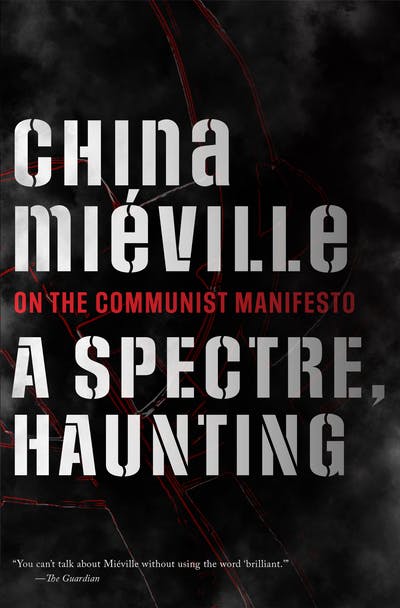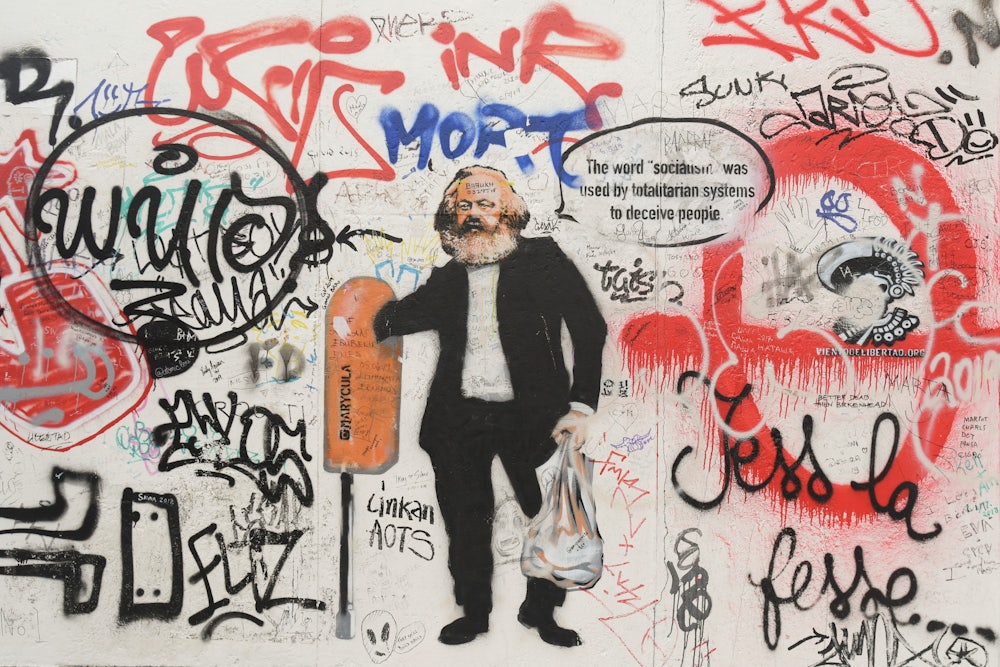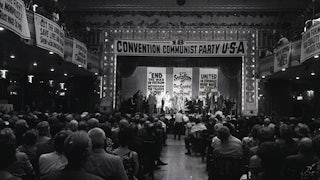At the wintry end of a ravenous year, Karl Marx rode a ferry from London back to his garret in Brussels, charged with a simple task: to pull together a written political program for a few hundred radical émigré workers who had decided to call themselves—openly, in defiance of all Europe’s spooks and cops—Communists.
Where to start? His close collaborator and friend Friedrich Engels had already prepared a 20-page question-and-answer sheet. “Question 1): Are you a Communist?” Answer: “Yes.” Both men agreed it was a poor first draft. Yet Marx kept it on his desk as he toiled; he stuck to its rapid-fire rhythms, its brashness. Christmas passed; 1848 shuddered into life. The manuscript piled up with phantasms: conjurings, spells, sorcerers, colossal enslaving machines, forged weapons, netherworlds, robes made of cobwebs, and gravediggers. From the Communist League’s committee in London came a bustle of letters: anxious at first, then pleading, then grumpy. If Marx did not deliver soon, “further measures” would be taken.

Harried by comrades (as well as by the Belgian police), Marx finally dashed off the closing passages and dispatched them to the private printing works of one J.E. Burghard at 46 Liverpool Street. Under the tang of hot lye and smeared ink, not more than a thousand copies of Manifest der Kommunistischen Partei were jammed between cheap green paper covers in February 1848. The result was, as the novelist China Miéville puts it in his new study, A Spectre, Haunting, “short and rude and vivid and eccentrically organized—and its impact has been utterly epochal.” Marx was 29 years old.
Because The Communist Manifesto has been so traduced and so feared, many people who haven’t yet read it think Marx’s polemic was either an instruction manual for overthrowing the government (Step 1, raid the police stations. Step 2, seize the post office, etc.) or wistful schematics for a society free of want and poverty. If those misconceptions haven’t put them off, curious first-timers often approach the Manifesto with fear and suspicion that it might be too dense, that some kind of rigorous training is needed to decode its pages, or that it has to be read alongside an accompanying glossary of terms—like A Clockwork Orange or “The Waste Land.”
This is (mostly) untrue. China Miéville’s brief primer aims to show that Marx’s words remain just as immediate and vital as when they were first hastily composed more than a century and a half ago. An “introduction to an indispensable text” for the “curious and open-minded,” A Spectre, Haunting is an ardent advocate’s attempt to illuminate and re-enchant a seminal text for fresh generations. A skilled scholar and synthesizer of the vast corpus of Marxism, Miéville may, however, overstate how much of Marx and Engels’s “ecstatic rant” can be applied today. To the radical workers of 1848, Marx opened up a vast new terrain of struggle. For a modern socialist movement weakened and regrouping after decades of defeat, there are limits to what the Manifesto can do.
Miéville is best known for his lucid and eerie novels, including The City and the City and Perdido Street Station, which blend far-flung science fiction with a rigorous understanding of class politics. His most recent work was October: a rapid and torquing narrative history of the Russian Revolutions. One of the best sympathetic works ever written about the churning days from February to October 1917, October stripped away the baggage of judgment from events and characters, transforming the upheaval into a flash of miraculous potential. Rather than depicting a project doomed by its own inherent faults to be a disaster, he praises that crucial moment when the barreling train of history is shunted across onto stranger sidings. In doing so, Miéville decisively proved that he could combine the command of the historian with the ingenuity of the novelist, a forbidding and fearsome accomplishment.
Movement, momentum, rupture, possible worlds felt but not yet grasped: No wonder Miéville should be drawn to examine Marx and Engels’s famous declarations, not only as a committed leftist but as a stylist too. Brassy and swaggering, The Communist Manifesto rushes up on readers like an avalanche. In its compacted span, the text skips, as if powered by some infernal engine, across eons and eras: from mud hut to modern hovel, from Iron Age to ironclads. Its tense and tenor, the Marx biographer Sven-Eric Liedman observed, “is at once the present and the future.” Marshall Berman called its prose style “expressionist lyricism.” Its vigorous language was necessary to sum up how the planet had been rapidly remade since the start of the century—a voice that reached far beyond Blake’s “dark, Satanic mills.”
Marx imagines the emerging economic system as something like a whirlwind: all the peasant smallholders, all the artisans and journeymen thrown down from their stable lot, scrubbed clean of what had once been sure identities. Not long ago, the system of landlords, family plots of farmland, guilds, workshops, and the national church seemed secure and unchanging, yet it was all being upended by the squalid factory, the city slum, the ballooning fat cat. The bravura first section sees Marx trying to apprehend this new world, even as it squalls and thunders around him, with its most famous passage serving as both an indictment of and a hymn to capitalism’s terrible power:
The bourgeoisie, wherever it has got the upper hand, has put an end to all feudal, patriarchal, idyllic relations. It has pitilessly torn asunder the motley feudal ties that bound man to his “natural superiors,” and has left remaining no other nexus between man and man than naked self-interest, than callous “cash payment”.… All fixed, fast-frozen relations, with their train of ancient and venerable prejudices and opinions, are swept away, all new-formed ones become antiquated before they can ossify. All that is solid melts into air, all that is holy is profaned, and man is at last compelled to face with sober senses, his real conditions of life, and his relations with his kind.
And still it hurries on, leaving bluster, awe, and questions in its wake. Marx’s goal was not merely journalistic, or even narrowly political. Many adherents often forget this because it seems obvious, but the Manifesto also saw the debut of a singular theory. All written history, the theory goes, is the history of class struggle. This conflict waged between the dominating and the dominated produced, at the dawn of modernity, a new class: the capitalists, defined by the profits they extract from the labor of everyone beneath them. Because the exploited—the proletariat—have nothing to fall back on, nowhere further to sink, their liberation would be the liberation of history from class struggle.
In A Spectre, Haunting, China Miéville summarizes it this way: “It’s as workers that workers create capitalism’s wealth. It’s that position, and the power implicit in it, that underlies why the working class is uniquely placed to change the economic system—to take control of society and its productive capacity, which does not exist without it.” The point of The Communist Manifesto, then, is to taunt its readers to roll up their sleeves and crack knuckles, to enter this “uninterrupted, now hidden, now open fight.”
For as long as radicals have squabbled over the meaning of Marx and Engels’s works, there has been a lot of fretting over whether the revolution they herald is inevitable. After all, the Manifesto shivers with fervent certainty, liberally employs words like “necessary,” and smudges the line between prediction and incitement. When Marx insists that “the working men have no country,” is he stating a universal truth? Or instead urging the workers to throw off their national allegiances? In other words, should the Manifesto today be considered primarily as a work of meticulous doctrine or a compelling and detailed piece of propaganda?
Throughout A Spectre, Haunting, Miéville tries to argue that it can be both. He can write observantly of how the Manifesto echoes the pulse of Christian creeds familiar to millions of Europeans, and also how it evoked millenarian pamphlets that popped up during periods of rural strife with their frantic summons to the apocalypse. But in a long section on criticisms of the Manifesto, Miéville runs close to thinking the pamphlet is rigorous or developed enough to be treated as a bit of scripture, with falsifiable forecasts at its heart. In fact, precisely because of its passion and haste, there is a fair amount of the Manifesto that does not hold up to challenge.
Cuts to the costs of production do not always, as Marx claimed, push down workers’ wages. The Manifesto’s brief passages on the relationship between women and capital are, while observant, perfunctory at best and hardly as nuanced or incisive as what early feminists were discovering for themselves. (That didn’t deter Helen Macfarlane, the Scottish Chartist who was the first to translate it into English in 1850, from rendering the famous “spectre” of the opening line as “frightful hobgoblins.”) In the benighted colonies of European powers, the bourgeoisie did not create, as Marx insisted it would, a “world after its own image.” Far from rapidly industrializing like the northern countries, British-ruled India was kept in a permanent state of ruinous underdevelopment; regearing the mass of agricultural society for the export market sparked periodic famines rather than plenty. The Manifesto also contains nothing at all on the subject of race, despite Marx’s own public fidelity to abolition.
Many of these errors, omissions, and oversights would be refined by Marx and Engels themselves in the later works; others had to be painfully corrected by those following in their stead. Still, that corrections need to be made at all highlights the problem of rummaging through the Manifesto as if were an academic textbook. Submit it to too much hairsplitting, and the whole thing will be robbed of its incantatory power. On the other hand, treat the Manifesto as exquisite propaganda, and its blunders and lapses can be overlooked in favor of its overriding spirit.
In a way, what China Miéville has written is an inadvertent tribute to the smallness of The Communist Manifesto. Its influence was “utterly epochal,” yes, but that came much later—especially when the European socialist parties came to the fore in the early 1900s, especially after the formation of the Soviet Union. In its own time, Marx and Engels’s program was hardly read beyond the tiny correspondence committees of radical workers and intellectuals already well versed in the emerging socialism of Proudhon, Fourier, and Owen. If one were to make an educated guess, between 1848 and the Paris Commune of 1871, probably not more than a few thousand people had ever heard about this swingeing little book. In the grand tradition of left-wing groupuscules, the first Communist League, for which the Manifesto was written, fell apart as quickly as it assembled.
Contrary to the deranged fevers of its enemies, the Manifesto is not some latent malevolent force in the world, lying in wait to curse and seduce the innocent. In fact, its popularity is more often a barometer of radical action already underway: Sales and samizdat prints shoot up when the edifice of capitalism seems a little more rickety than normal, after working people have already realized that they don’t have much left to lose but their shackles. This was true of the Manifesto in its birth as well. By the time it was being fired out of Mr. Burghard’s shop in London, the masses were already assembling their barricades in Paris, in Warsaw, in Budapest, in Frankfurt. Marx prophesied the revolutions of 1848, but he did not spark them.
Despite its immense oratorical push, the Manifesto could only ever be a first declaration of hostilities against capitalism. It was the anchor to which a long chain of radicalism could be fixed, not the summa of a vast and world-shaking belief. Marx couldn’t quite distill all the world in its period of violent flux; he had the vision but not the particulars. Yet its brisk and sharp voice still gives us whiplash; its grand historical argument still moves. As China Miéville puts it in one of his more eloquent phrases, there was “soil in its pages in which such understandings could grow.”






